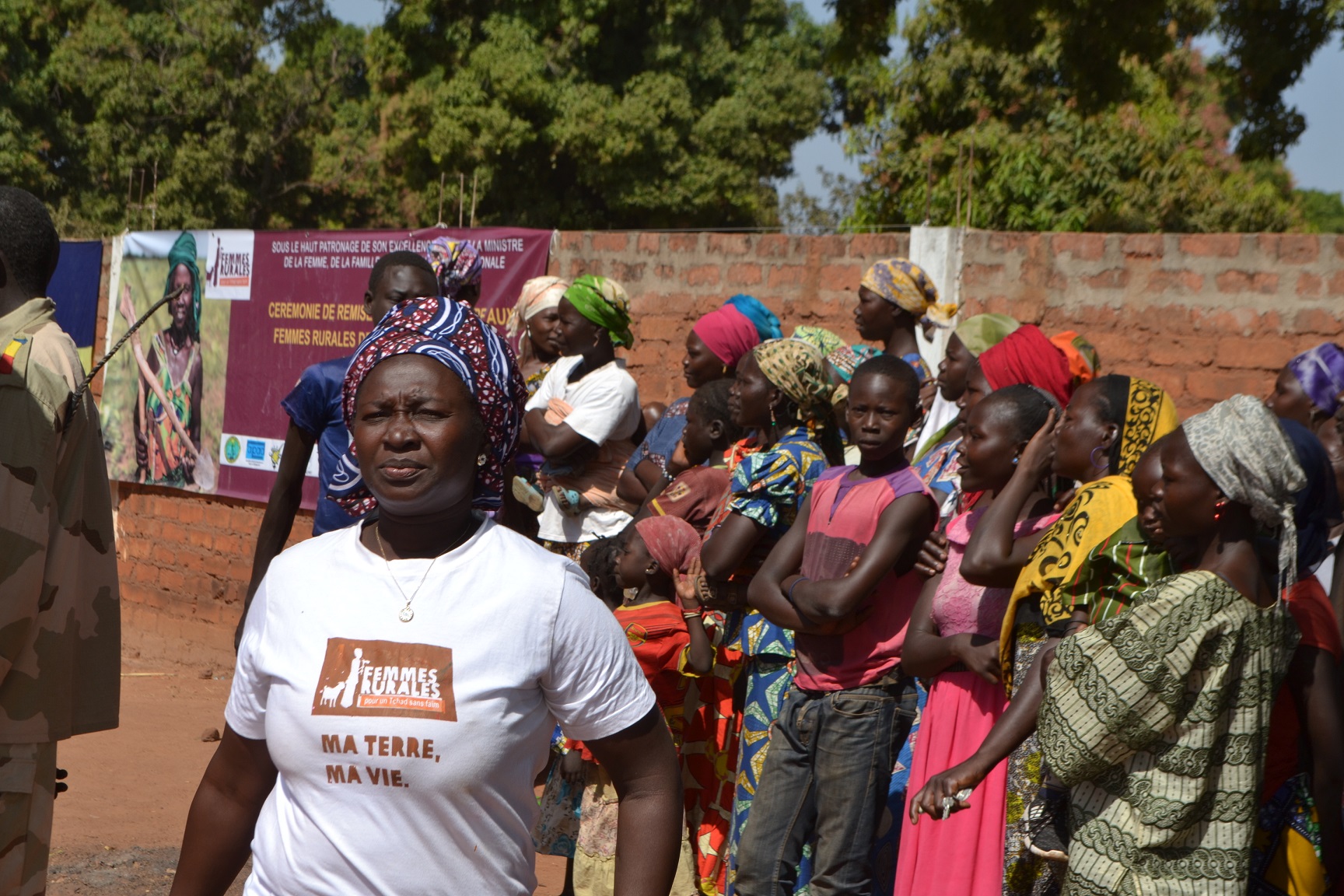Chad is at the verge of an emerging land tenure crisis. As observed in many countries in Africa, formal and customary tenure systems overlap. Customary tenure systems, that generally prevail in rural areas, differ from region to region, with each its own needs and practices. Land conflicts are abundant, caused by degradation and transformation of land surfaces caused by climate change, as well as land investments by domestic investors with disputed legitimacy. Women, particularly, struggle in practice to obtain the same rights to land as men, even though country’s constitution enshrines gender equality.
Oxfam works to support to socio-economic land reform in Chad, with special attention for inclusion of women and youth, strengthening civil society organizations, capacity building on agricultural practices and dispute resolution mechanisms.
Our knowledge partner Neil Sorensen (Land Portal Foundation) interviewed Barbara Codispoti from Oxfam Novib to reflect on how scaling plays a role in their project.
How do you define scaling and what does it mean in your project? If you had to define your scaling ambition in your project, what would it be?
“Our scaling ambition in this project is twofold. Firstly, we aimed to bring about a significant shift in the importance given to land-related issues on the political agenda and within development interventions. Previously, land reform was dormant, and interventions focused on land and natural resource governance were limited or absent. Civil society debates on land were fragmented and isolated. Therefore, our primary objective was to consciously elevate land as a crucial topic and incorporate it into policy discussions and development initiatives.
Secondly, considering the magnitude of the problem and the needs on the ground, we aimed to achieve a greater impact than what could be accomplished by a single actor or a time-bound project alone. Our goal was to encourage the involvement of multiple actors and stakeholders who could take ownership of the initiative, expand upon the original idea, and contribute to its improvement. We consider this "scaling up" when other actors embrace and enhance the actions initiated, thus creating a relay effect that propels progress towards equitable land governance.
A concrete example of scaling up in Chad is the tripartite cooperation between FAO, Oxfam, and LAND-at-scale, in collaboration with the Ministry of Land Affairs. This partnership has evolved over time, becoming mutually reinforcing and resulting in a more robust and comprehensive approach. This collaborative effort demonstrates how scaling up involves the many interconnected steps necessary for complex work to contribute to positive change in land governance. Importantly, our project has garnered significant interest and participation from both international and national actors who previously had limited involvement in this area.
In summary, scaling in our project means expanding the reach and impact of our intervention program, raising the profile of land-related issues, and fostering collaboration among various stakeholders.”
Our scaling ambition is to place land on the political agenda, integrate it into development initiatives, and encourage the active engagement of multiple actors to drive lasting and equitable change in land governance in Chad.

What elements could prevent you from achieving your scaling ambition?
“Several elements could pose challenges to achieving the scaling ambition in Chad, particularly in implementing the LAND-at-scale impact program. Firstly, Chad's fragile state as the second lowest-ranked country in the Human Development Index presents a significant hurdle. The country's political transition, characterized by security issues and numerous humanitarian crises, including the recent refugee crisis from neighboring Sudan, demands immediate attention and resources. These pressing concerns could divert attention and resources away from initiatives like LAND-at-scale, impeding its progress.
Furthermore, the success of the LAND-at-scale program depends on having an enabling political space and a long-term vision for addressing structural issues such as land governance. However, in a country facing multiple challenges, maintaining a consistent political focus and ensuring the necessary long-term commitment may prove difficult. Shifting priorities and limited resources might hinder the implementation of the program and prevent the desired impact.
Maintaining a consistent political focus and ensuring the necessary long-term commitment may prove difficult [to achieve success]
Another obstacle to achieving the scaling ambition lies in potential resistance from those with vested interests in maintaining the status quo. The proposed vision for equitable land reform may be met with opposition from individuals or groups who benefit from the current system. These stakeholders may hold decision-making power and have the ability to obstruct or undermine the necessary reforms. Overcoming such resistance requires careful engagement and strategic approaches to garner support and address concerns effectively.
In summary, the scaling ambition in Chad faces various impediments. The country's fragile state, characterized by political transition, security issues, and humanitarian crises, can divert attention and resources away from programs like LAND-at-scale.
Additionally, the need for an enabling political space and long-term commitment may be challenging to sustain amidst competing priorities. Moreover, resistance from those with vested interests in maintaining the status quo poses another significant barrier. Addressing these elements will be crucial to overcoming challenges and realizing the scaling ambition in Chad.”
What would your ideal scaling ambition be?
“In our theory of change, our ideal scaling ambition for the project encompasses several key elements. At the national level, we envision a long-term leadership and policy vision that promotes sustainable land governance. This includes fostering increased accountability among both national and local actors involved in land management. Additionally, we aim to integrate land governance into other programs, thus rebalancing power dynamics and ensuring a more inclusive approach.

To achieve our scaling ambition, we recognize the importance of clarifying the roles and responsibilities of local actors while simultaneously strengthening their capacity to effectively participate in land governance processes. By doing so, we aim to enhance the legitimacy and legal framework surrounding tenure security, ultimately leading to increased security and rights for individuals and communities.
We recognize the importance of the roles, responsibilities [and participation] of local actors
Central to our scaling ambition is the evidence of the positive impact that improved tenure security can have on livelihoods, social cohesion, and social justice. We seek to demonstrate tangible outcomes that showcase the significance of tenure security in enhancing the well-being of individuals and fostering stronger and more equitable communities.
Moreover, we aim to bolster the credibility of citizen action through increased access to public and transparent information. By ensuring that relevant data and knowledge are readily available, we empower citizens to make informed decisions and actively participate in shaping land governance processes.
Lastly, we emphasize the need for increased research and innovation focused on land tenure security. By encouraging and supporting research efforts in this domain, we can deepen our understanding of the challenges and opportunities related to tenure security, paving the way for more effective and evidence-based interventions.
Overall, our ideal scaling ambition encompasses a comprehensive approach that spans national leadership, accountability, capacity building, tenure security, evidence ofimpact, citizen engagement, and research and innovation. By pursuing these objectives, we strive to create lasting positive change in land governance and contribute to sustainable development.”
What challenges, bottlenecks, do you see in your existing context that inhibit this ambition?
“In order to achieve the ambition of a long-term political vision for equitable land governance, there are several critical challenges and bottlenecks that exist within the current context in Chad. The foremost challenge lies within the governance system itself. It is important to recognize that expecting all stakeholders and interested parties to willingly come to the table and commit themselves to equitable land governance in Chad might be overly optimistic. The complex nature of the governance system and the diverse interests involved make it difficult to achieve consensus and collaboration.
Another significant bottleneck is the effectiveness of decentralization in the country. It becomes challenging to discuss institutional strengthening when the transfer of responsibility and authority lacks effectiveness or fails to adhere to the rule of law. Inadequate knowledge of current legislation is a prevailing issue, not only among those responsible for enforcing it but also among those tasked with protecting it, such as the judiciary. This knowledge gap hinders the implementation of equitable land governance practices and undermines the enforcement of relevant laws.
Furthermore, a restrictive civic space and a pervasive climate of suspicion pose additional challenges. The limited room for civic engagement and open dialogue inhibits the participation of various stakeholders and obstructs the development of inclusive policies and practices. The prevailing atmosphere of distrust makes it difficult to build consensus, foster collaboration, and establish a foundation of trust necessary for equitable land governance.
To achieve the ambition of equitable land governance in Chad, it is crucial to address these challenges and overcome the existing bottlenecks. This will require a comprehensive approach that involves engaging all stakeholders, strengthening institutional capacity, improving knowledge and awareness of existing legislation, and fostering an inclusive and open civic space. By tackling these obstacles head-on, it is possible to pave
the way for meaningful progress toward a more equitable and sustainable land governance system in Chad.”
What would be your definition of sustainability and achieving structural change? What can project implementers do to ensure sustainability when it requires the sustainability of systems and changes in behavior that are not entirely within your control?
To be effective, institutional scaling of practices, behaviors and visions (which could lead to sustainability and some structural change) requires clarity of roles and responsibilities and a governance system based on the rule of law. Therefore, before talking about institutional scaling, it is important to consider whether it is also more fundamental to contribute to creating the conditions for scaling. This requires looking a bit beyond the scope and reach of the project. As mentioned above, broader issues of governance, decentralization, judicial effectiveness and access to justice are relevant to ensure that what we do in the project is not done in vain. It is important for the project to take all this into account to guide its actions.
It is fundamental to contribute to create the conditions for scaling
How does inclusivity materialize in your project and activities? RVO has also included inclusive approaches and multi-stakeholder engagement as factors for sustainability. Do you agree with this? And how does this materialize in your project strategy and activities?
“The title of the project clearly emphasizes inclusiveness, both in the reform process and in the operational strategy. We are working in parallel at the national and local levels. As mentioned earlier, the plurality of perspectives and collaboration is at the core of what we consider to be scaling up. This may take longer than expected, but what we achieve in the process is sometimes as important as the final product. For me, the land policy formulation process in Chad is a glaring example. Creating the space and time to listen to different stakeholders in all the provinces of the country, a space that did not exist before, may have been as important an outcome as the final policy itself.”
We have the urgency of the 2030 Agenda. LAND-at-scale wants to promote holistic and responsible scaling. What do you think needs to be done to move things forward?
“I don't have a magic answer, I can only say that:
Upscaling and urgency might convey the idea that we need to do things big and fast, whereas I think we need to do things with patience and time, only with that can we achieve impact at scale.



